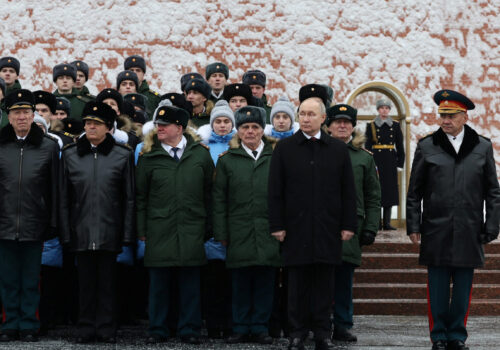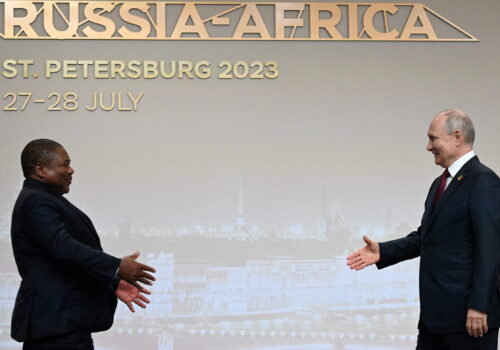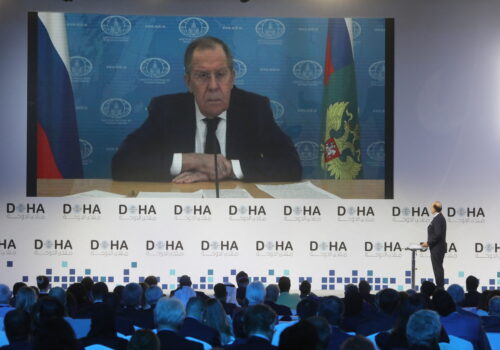In Latin America, Russia’s ambassadors and state media tailor anti-Ukraine content to the local context
This is one chapter of the DFRLab’s report, Undermining Ukraine: How Russia widened its global information war in 2023. Read the rest here.
Russia deploys various strategies to communicate its narratives and advance its interests in Latin America. State media outlets RT and Sputnik continue to be the centerpieces of Russian communications in the region. Further, Russia is using more targeted communications tailored to topics that raise more interest in each country. In this strategy, ambassadors play a role by becoming legitimized spokespersons in national media and placing their op-eds in these spaces, which enables them to articulate the Kremlin’s narratives to Latin American audiences. Likewise, the Kremlin benefits from journalists and influencers who, although not officially affiliated with Russian media, serve as disseminators of pro-Russia propaganda. The DFRLab team analyzed how these strategies played in the Latin American information space during 2022 and 2023, supporting Russian narratives concerning its war against Ukraine, as well as other topics critical for Russia’s geopolitical goals.
Russian public diplomacy efforts
In 2023, the DFRLab examined public communications of Russian embassies in Brazil, Mexico, Argentina, Colombia, Venezuela, Chile, Ecuador, Bolivia, Cuba, and Nicaragua from January 1 to October 31 of that year. Russian ambassadors frequently gave media interviews to national media outlets, which sometimes published op-eds by the ambassadors. The topics addressed by the Russian ambassadors would often vary, focusing on what is most relevant to each country and combining variations of its narratives.
The war in Ukraine was the dominant topic in Brazil, where the Russian ambassador referred to the denazification of Ukraine in 176 statements, while referring to other issues in fewer than seventy statements. During the period of our analysis, Russian diplomats in the nine Spanish-speaking countries often referred to the Ukraine war, but it was the most commonly addressed topic only in Chile and Argentina. Nineteen out of thirty-eight statements by Russian diplomats in Chile referred to the war, often portraying Ukraine as the aggressor and responsible for war crimes. And in Argentina, seventeen out of sixty-six statements referred to Ukraine as a Nazi state and to the war as a denazification operation. In the rest of the region, Russian diplomats focused more frequently on other topics that resonate with local issues, such as US imperialism, sanctions, the rise of the multipolar world, and economic matters.
In Argentina, the dominant Russian narrative was that the “special military operation” aimed to “denazify” and demilitarize Ukraine, which was framed as a Russophobic and corrupt country. Ambassador to Argentina Dmitry Feoktistov has been interviewed by Argentinian newswire Telam, a government-owned entity under the control of the Ministry of Public Communication, whose content is reproduced by numerous Argentine public and private media outlets. Feoktistov highlighted the importance of the multipolar world, Russia’s support for Argentina’s accession to BRICS (the intergovernmental bloc involving Brazil, Russia, India, China, and South Africa), and the common fight against colonialism, pointing specifically to “the Malvinas War,” commonly known as the Falklands War in English-speaking countries, itself a heritage of colonialism and thus an Argentine cultural touch point. The embassy constantly emphasized Russia’s solidarity with Argentina, referring in particular to its efforts supplying the country with the Sputnik V vaccine against COVID-19.
Brazilian news websites and blogs published 176 articles quoting the Russian ambassador, Alexey Labetskiy, between January 1, 2023, and October 23, 2023, according to a query conducted using Meltwater Explore, a news and social media monitoring tool. During his media engagements, Labetskiy maintained the Kremlin narrative that the invasion of Ukraine was a special operation to denazify the country. In a September 2023 interview published by the online version of the newspaper O Globo, Labetskiy accused Ukraine of neo-Nazism; five other digital outlets in Brazil also republished the interview. In the interview, the ambassador also emphasized Russia’s role as a strategic partner for Brazil to achieve its goal of obtaining a leadership role on the international stage and becoming a permanent member of the United Nations Security Council.
In Chile, the predominant Russian narratives were that Ukraine was the original aggressor and that Russia was defending itself and fighting the resurgence of Nazism. Op-eds by Russian Ambassador to Chile Sergei Koshkin are regularly published by the left-wing digital outlet Crónica Digital. In his op-eds and interviews, Koshkin maintains that international media is plagued with “fake news” about the war, alleging that Russia is blamed for crimes perpetrated by Ukraine in Mariupol and Bucha. Other topics frequently addressed by the Russian ambassador are economic opportunities in Russia-Chile relations, the rise of the multipolar world, and the struggle against colonialism.
Meanwhile, the Russian Ambassador to Mexico Nikolay Sofinskiy maintained that the conflict in Ukraine originated from NATO aggression and that the Kremlin’s “special military operation” is intended to protect the Russian-speaking population from extermination while demilitarizing and denazifying Ukraine. According to his version, Russia reacted to the imposition of a colony controlled by Washington. In an op-ed published by influential left-wing daily La Jornada, Ambassador Sofinskiy alleged that the United States and its allies use Ukraine for the profiteering of the US military-industrial complex.
In his statements to Colombian media, Russian Ambassador to Colombia Nikolay Tavdumadze has expressed satisfaction with the “balanced” position of Colombian President Gustavo Petro and his decision to not send military equipment to Ukraine. In contrast, Tavdumadze has repeatedly complained that Colombian media coverage reflects the biased version of Western newswires and ignores reports from RT, Sputnik, and his embassy. Despite the complaints, Tavdumadze has been interviewed several times by prominent Colombian media outlets and had an op-ed appear in El Tiempo, the most influential newspaper in the country. In that op-ed, he contended that sanctions against Russia restrict food production in his country and affect global food security, while the maritime corridor initiative for exporting Ukrainian grain only benefited Western Europe without considering the needs of the poorest countries in Africa.
Finally, Russian Ambassador to Ecuador Vladimir Sprinchan frequently referred to the war in Ukraine indirectly, focusing instead on Ecuador’s economic interests. Sprinchan, however, highlighted how sanctions on Russia affect international trade and food security, and how former Ecuadorian President Guillermo Lasso’s position condemning the invasion negatively affected Ecuador’s agribusiness interests. Sprinchan’s communications during 2023 also included an op-ed in which he denied accusations of Ukrainian children being abducted to Russia, a war crime, and instead presented the version that the children had been evacuated from the war zone for their own protection.
The role of RT en Español and Sputnik Mundo
As the Kremlin deploys its global media apparatus to shape regional narratives around the war, understanding how its Spanish-language outlets target Latin American audiences becomes crucial. With millions of readers and followers on social media across the region, RT en Español and Sputnik Mundo have played an important role in disseminating pro-Kremlin narratives about the war in Spanish-speaking countries.
This analysis examines how the two state media outlets have covered the conflict, focusing on content published by the two outlets from January 2022 through August 2023. To conduct this analysis, the DFRLab gathered and analyzed news articles from RT en Español and Sputnik Mundo containing the keyword “Ucrania” (“Ukraine” in Spanish) to examine recurrent topics and narratives. According to data collection using the news monitoring platform Event Registry, these outlets published more than 6,100 articles on Ukraine during the first eight months of 2022, with the largest spikes occurring in tandem with the overall news cycle. During this period, RT en Español and Sputnik Mundo’s news articles on Ukraine centered on the ongoing conflict, frequently referring to the invasion as a “special military operation.” An analysis of the articles that received the most Facebook interactions revealed dominant narratives justifying Russia’s military actions, including alleged Ukrainian aggression, NATO expansionism, and the goal of “denazifying” Ukraine. Additionally, many articles emphasized other topics such as sanctions, energy infrastructure, weapons flows, and political issues, including actions taken by social media platforms to ban Russian state-backed media.
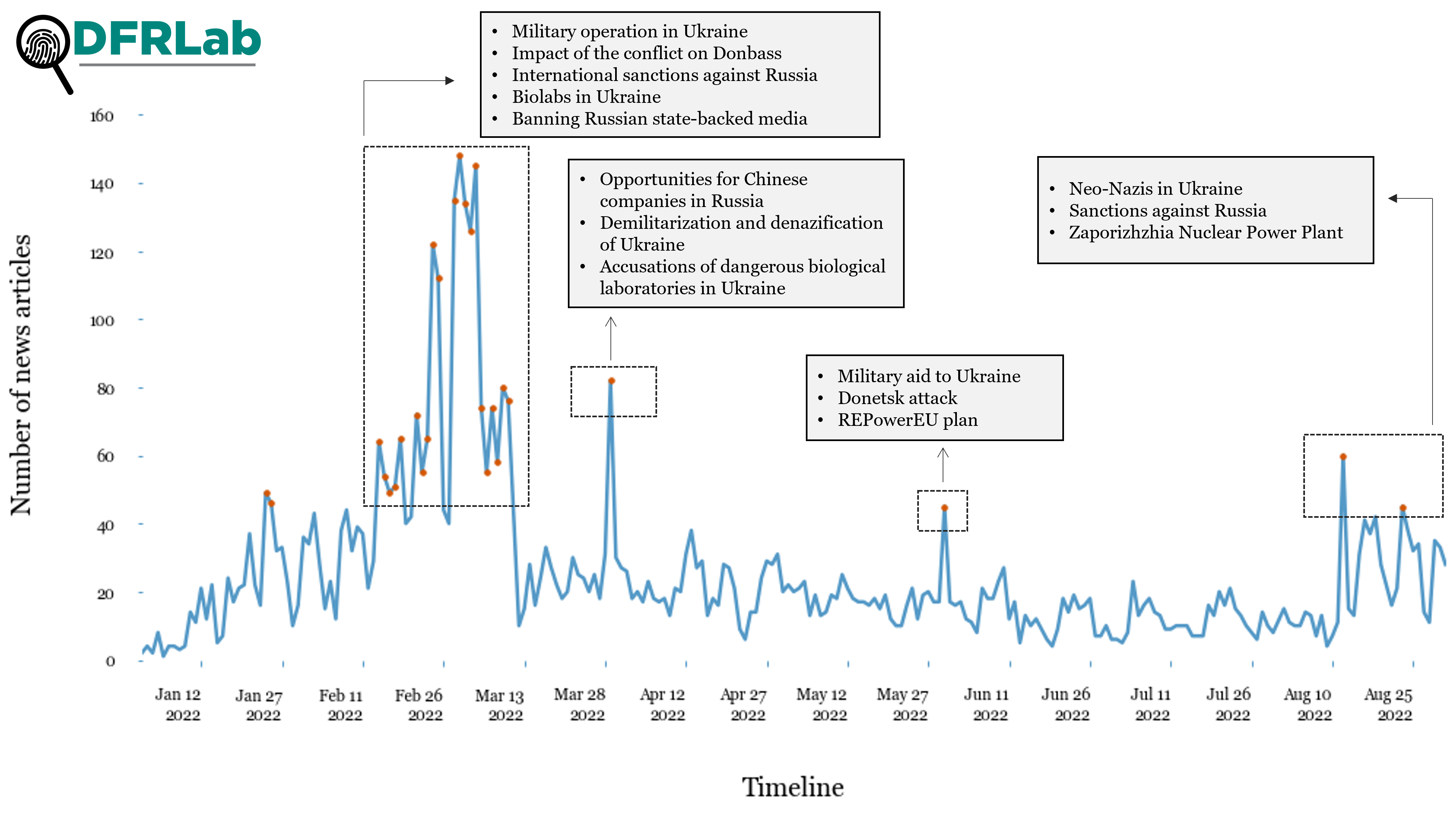
Between January 1, 2023 and August 31, 2023, RT en Español and Sputnik Mundo published over 6,300 articles related to the war in Ukraine, a 200-article increase over the previous time period in 2022. The two outlets maintained their overwhelmingly pro-Russian coverage of the war, with the most frequent narratives emphasizing alleged Ukrainian aggression, criticism of military aid to Ukraine, and the impacts of Western sanctions on Russia. Unlike 2022, when significant spikes in coverage emerged around key news events, the 2023 distribution revealed a more consistent stream of articles, typically with a daily range of between twenty to fifty published articles.
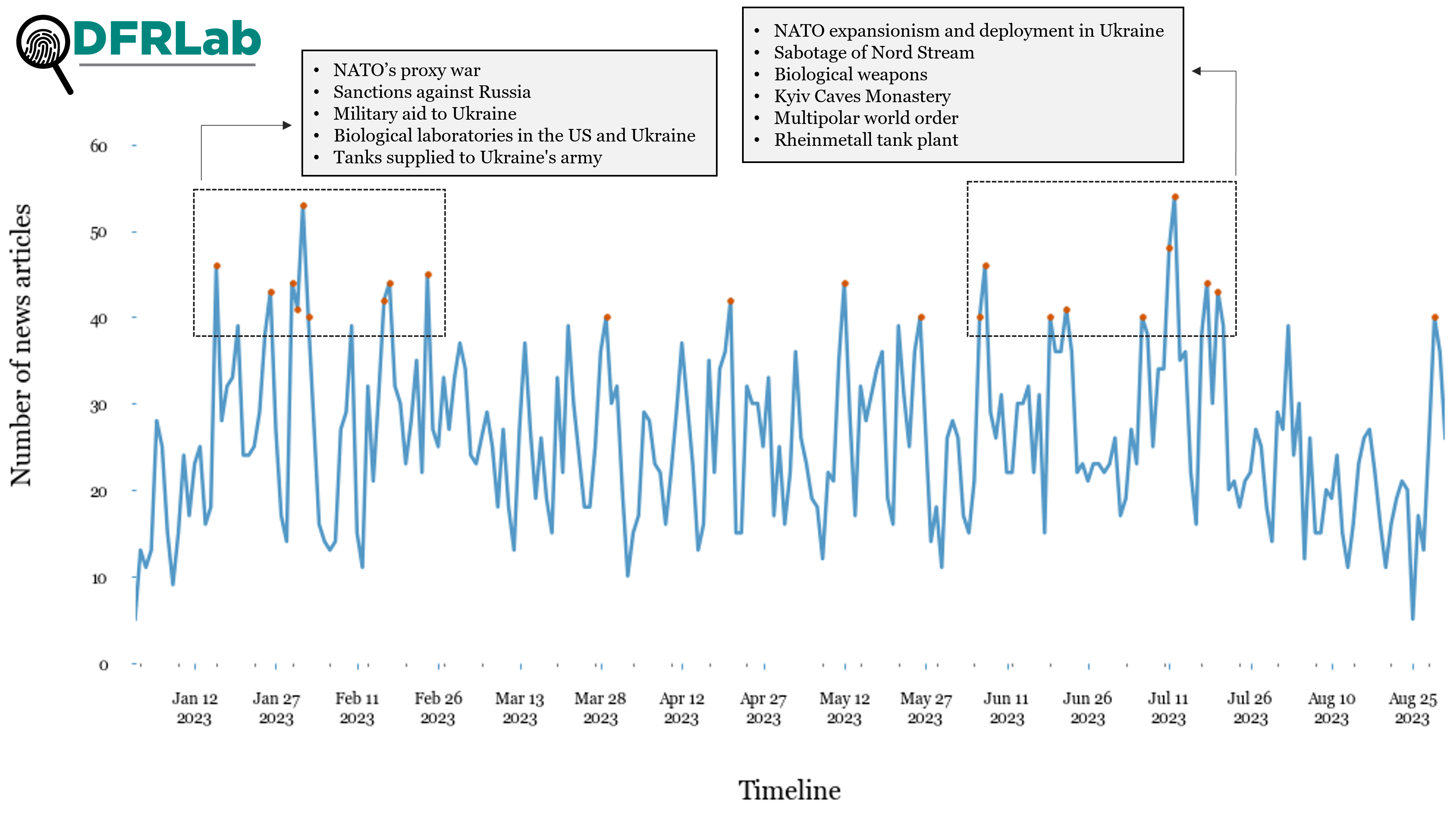
Using named entity recognition, a natural-language processing methodology used to identify and classify names of people, organizations, and locations, the DFRLab identified the most frequently mentioned names in relation to the articles that received the most engagement.
According to this analysis, the outlets placed greater emphasis on narratives criticizing Western military assistance to Ukraine in 2023, while also highlighting geopolitical themes around the “new world order,” NATO strategy, and alleged biological weapons. These narratives persisted throughout the eight-month period.
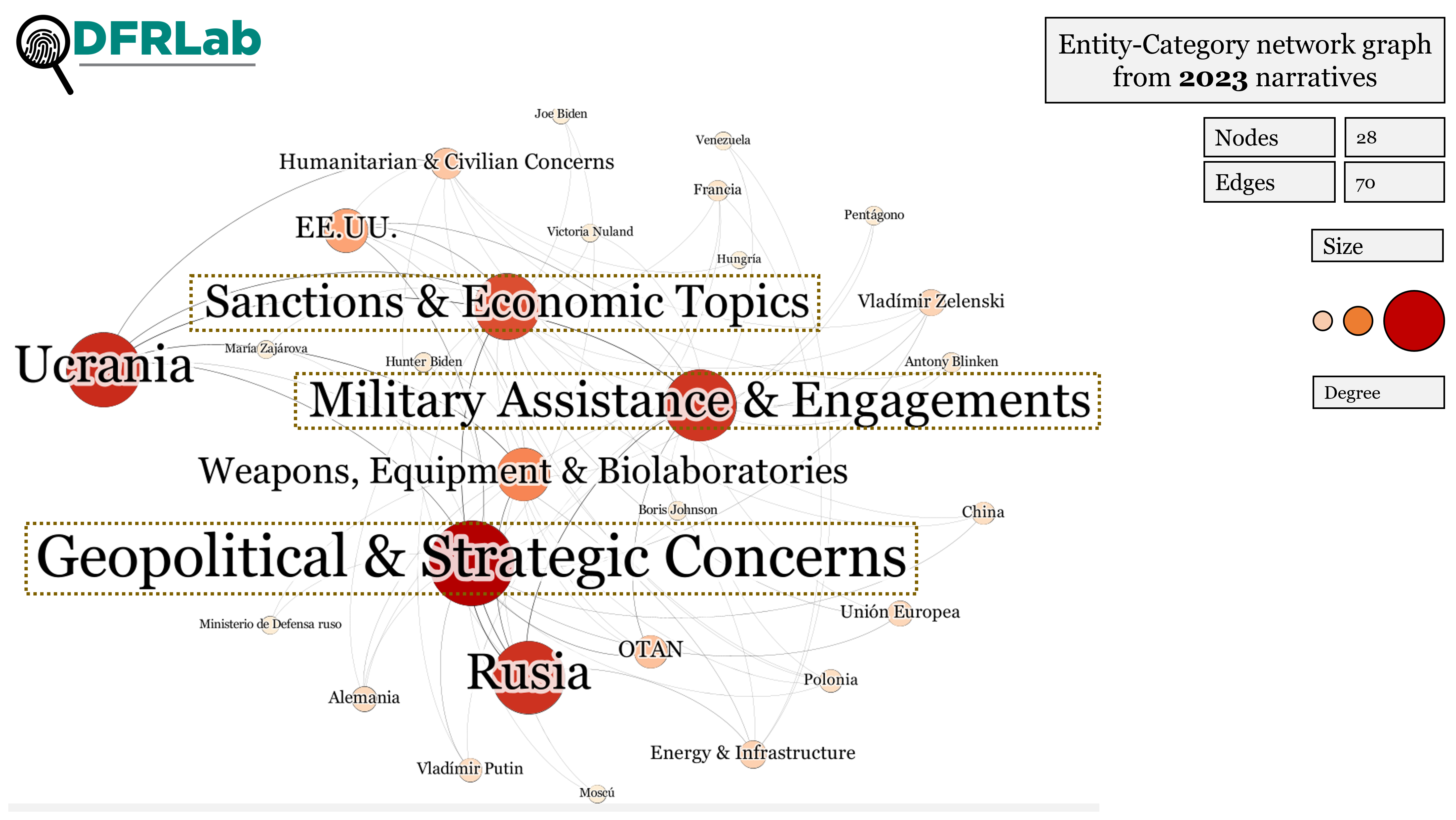
Building on these network patterns, a detailed review of 2023 articles showed the proliferation of disinformation narratives, like reinforcing the “proxy war” portrayal of the conflict as NATO waging war against Russia through Ukraine. The topic of supplying arms to Ukraine remained a steady media focus. Allegations also abounded regarding supposed US-backed biolabs in Ukraine and around the alleged presence of uranium and biological weapons. Additionally, the outlets persistently promoted anti-NATO rhetoric, criticizing the treaty organization’s military support for Ukraine.
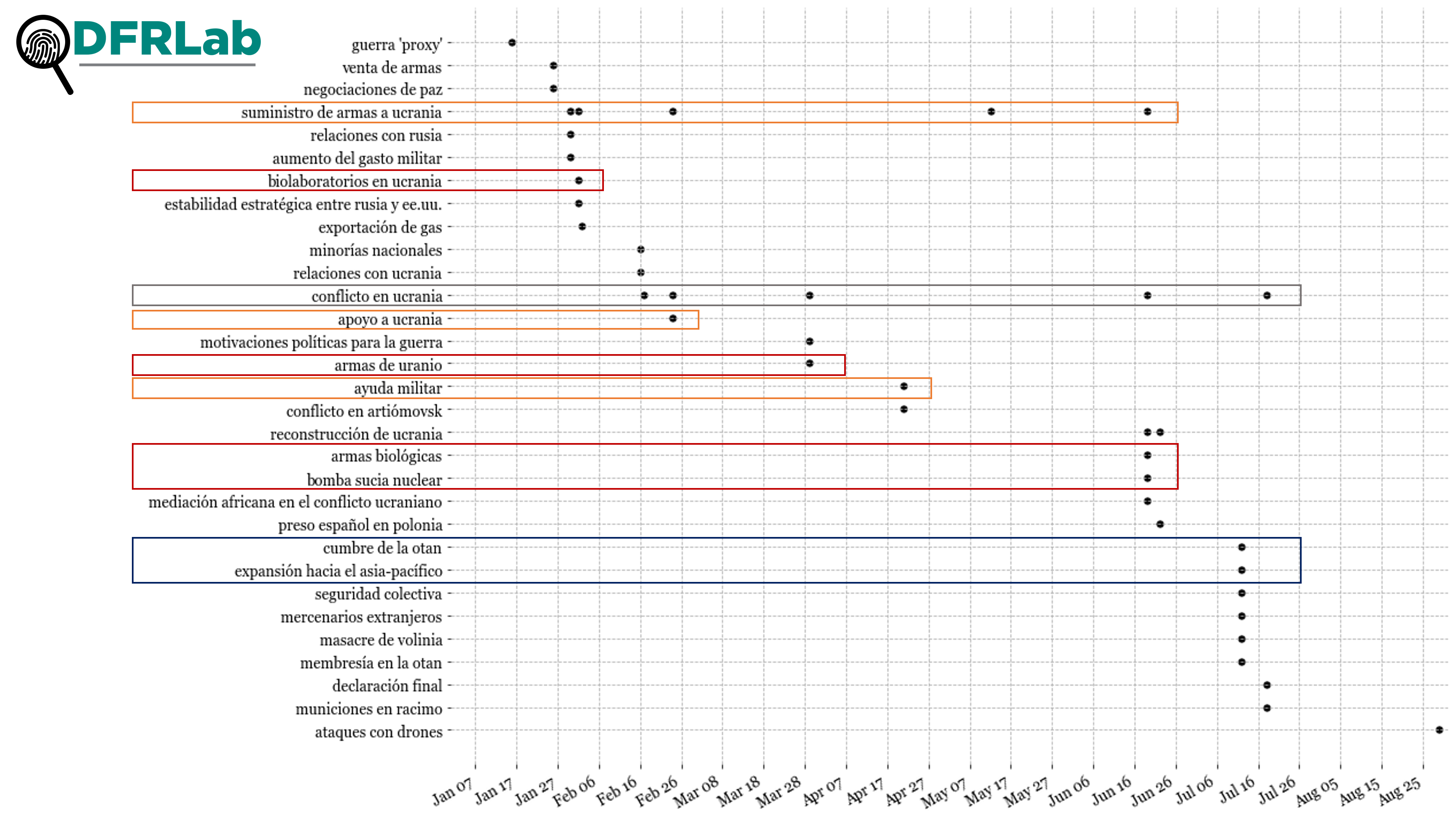
An examination of Facebook engagement data on RT en Español and Sputnik Mundo’s Ukraine articles showed a significant decrease in 2023. On high-volume publication days in 2022, stories on Ukraine garnered nearly 560,000 likes, reactions, and shares. In contrast, Facebook engagement dropped substantially in 2023, with articles receiving only around 18,136 interactions on peak publication days. While more research is needed, this substantial decline may reflect shifting audience interests and interaction patterns on Facebook rather than a loss of readership.
Sputnik Brazil and its impact on Brazilian websites and social media accounts
Sputnik Brazil was the main Russian media outlet operative in Brazil in 2023, as RT did not have a Portuguese version available at the time of the report. However, Sputnik Brazil’s operations changed over the year.
On March 18, 2023, Brazilian journalist Juliana Dal Piva reported on news website UOL that Sputnik Brazil had closed its office in the country, dismissing around twenty media professionals. The reason for the closure, according to Dal Piva, was the challenge Sputnik faced in processing bank transactions and paying local employees following Russia’s postinvasion ban from the SWIFT banking system. That same month, Brazilian journalist Carlos Madeiro reported that the Sputnik Brazil website had been the target of cyberattacks.
Four months later, the Sputnik Brazil website, which used to be hosted as a subdomain at https://br.sputniknews.com, changed to a new address, https://sputniknewsbr.com.br. Using a WHOIS search to review domain name registration information, the DFRLab found that the new address was created on July 8, 2023.
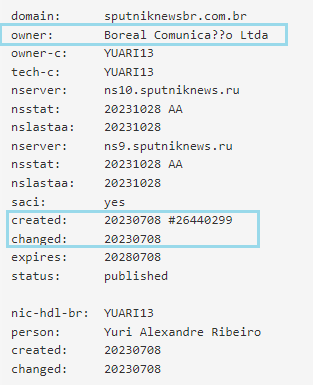
The DFRLab conducted a content analysis on articles mentioning the keyword “Ucrânia” (“Ukraine” in Portuguese) published by the website sputniknewsbr.com.br between August 1, 2023, and October 24, 2023, to identify the most frequent narratives spread by the outlet. The research resulted in 484 articles, according to data from Meltwater Explore.
Narratives promoting Russian military capacity were the most frequent topic covered by Sputnik Brazil within the entire period analyzed. In total, 127 pieces boasted about the skill and acumen of Russian forces and their military equipment, while an additional thirty-one articles labeled the Ukrainian forces as inefficient and unprepared for combat. Examples of this narrative also included criticism of the quality of military equipment provided by Western countries, the Ukrainian forces’ lack of skills in operating it, and Russia’s superiority in terms of strategy and military arsenal.
Another narrative frequently spread by Sputnik Brazil during the period analyzed was the possibility of Ukraine losing financial and military support, especially from the United States and EU. In total, there were seventy-eight pieces mentioning this topic. One of these articles received more engagement than any other articles about Ukraine, potentially reaching 691,000 people.
The piece, published on September 26, 2023, stated that the West was unsure about its support for Ukraine. It also highlighted how alleged Ukrainian government corruption had affected the chances of the country being successful in its counteroffensive against Russia, and how military equipment received from third parties had not improved the Ukrainian response to the invasion.
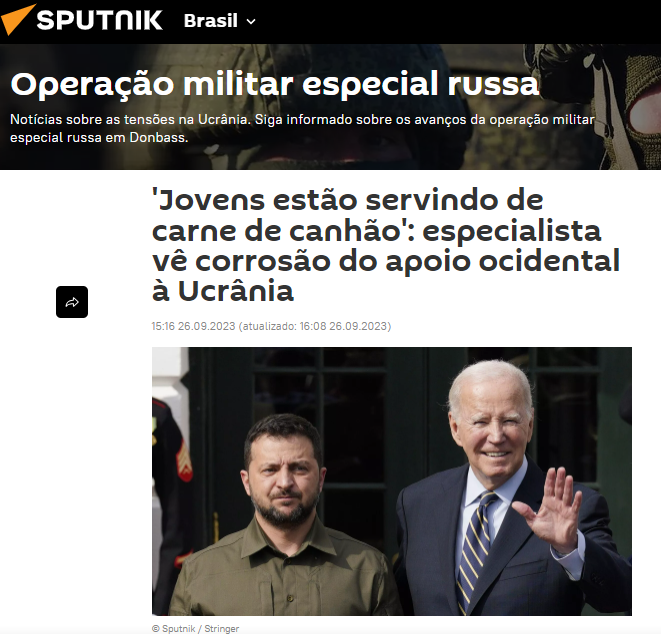
Sputnik’s reach, however, went beyond its own website, as local media outlets in Brazil amplified the Russian outlets’ narratives throughout 2023. The DFRLab found 5,610 reposted articles both on Brazilian news websites and social media platforms between January 1, 2023, and October 30, 2023.
The website Brasil247 reposted the most content from Sputnik and quoted the Kremlin most frequently, with 645 mentions over the period. Created in 2011 by Brazilian journalist Leonardo Attuch, Brasil247 is aligned with left-wing parties, especially the Workers’ Party (Partido dos Trabalhadores), of which President Luiz Inácio Lula da Silva is a member. A search using website analysis tool SimilarWeb estimated the average monthly audience of Brasil247 to be around 9.7 million, though that number does not account for multiple visits by the same person.
Former RT journalists and other actors amplifying disinformation narratives
Politicians, media outlets, journalists, and organizations based in Spain and Latin America have hosted former journalists from Sputnik or RT in Spanish, allowing them to amplify narratives about Russia’s invasion of Ukraine that align with the interests of the Russian regime. While not all of these individuals and entities may be directly linked to the Kremlin, they, as information vectors, serve to amplify narratives in line with the Kremlin.
Prior to the invasion of Ukraine, Inna Afinogenova, former deputy director of RT en Español’s website and a former host of RT’s program ¡Ahí les Va!, was one of RT’s most recognizable faces for Spanish-speaking audiences. Afinogenova remained inactive during the early stages of the invasion; on May 3, 2022, she announced the termination of her ties with RT allegedly due to her opposition to the war. Afinogenova has nevertheless continued to use her personal social media accounts to disseminate content similar to the narratives propagated by Kremlin-affiliated media, often placing blame on Ukraine, the United States, and the EU for the war, as well as for economic and social challenges impacting Spanish-speaking countries. Afinogenova’s posts closely monitor the political situation of governments aligned with Putin while criticizing media outlets or journalists that report on Afinogenova or left-leaning governments.
Afinogenova has expanded her presence to other accounts associated with media outlets that either originated on YouTube or have a significant portion of their audience on that platform, and are affiliated with politicians or media groups aligned with the left-wing or progressive movements in Spain and Latin America. Since June 30, 2022, Afinogenova has been one of three presenters for the program Macondo. According to another of its presenters, Uruguayan journalist Leandro Grille, the program takes an “alternative, more progressive, left-leaning perspective” in reporting Latin American news. The third presenter is Marco Teruggi, a former Latin American correspondent for Sputnik News, who also has affiliations with left-wing Latin American politicians and organizations. This includes his work on the electoral campaign of Colombia’s vice president, Francia Márquez. Teruggi is among the former collaborators of pro-Kremlin media who, during the initial stages of Russia’s invasion of Ukraine, expressed their discontent with platforms still labeling them as linked to their former Kremlin employers.
In Spain, where she is based, Afinogenova also is a presenter on programs on the streaming channel Canal Red and the website Diario Red. These media outlets are part of a media conglomerate started in 2022 by Pablo Iglesias, the former vice president of the Spanish central government and former leader of the left-wing party Podemos. Iglesias has promoted these media outlets through crowdfunding campaigns as alternatives to what he refers to as the power of the right-wing Spanish media. These media outlets remain connected to companies associated with Jaume Roures, a television mogul who has publicly supported the left wing in Spain as well as Cuba’s Communist regime.
An analysis of Canal Red’s YouTube channel, which boasts the outlet’s largest social media audience, showed that among the most-viewed videos were those hosted by Afinogenova, including some reaching almost two million views. In these videos, she argues that the United States is responsible for the ongoing Russian invasion of Ukraine, attributing its continuation to a lack of interest in negotiating the end of the conflict and an apparent reluctance to engage in direct conflict with Russia, “the country with the largest nuclear arsenal in the world.”
Related content

The Atlantic Council’s Digital Forensic Research Lab (DFRLab) has operationalized the study of disinformation by exposing falsehoods and fake news, documenting human rights abuses, and building digital resilience worldwide.
Image: Former Argentinian President Alberto Fernandez and Russian President Vladimir Putin in Moscow, Russia on February 3, 2022. Source: Sputnik/Sergey Karpuhin/Pool via Reuters
